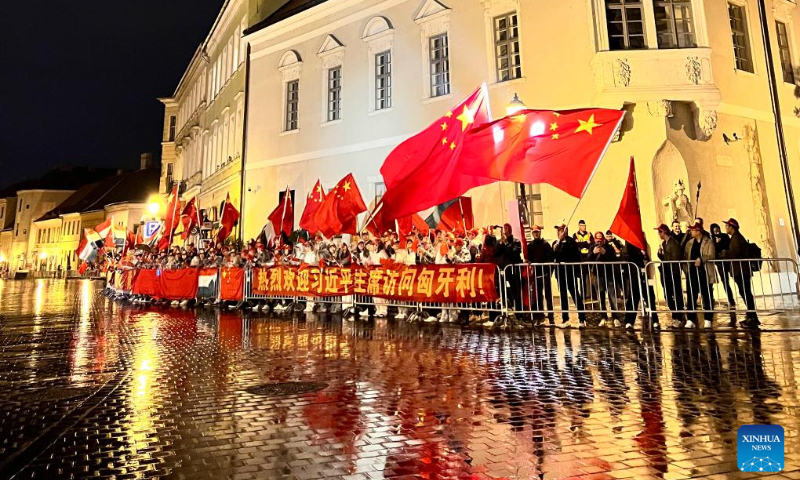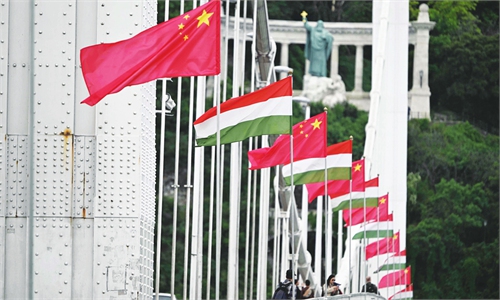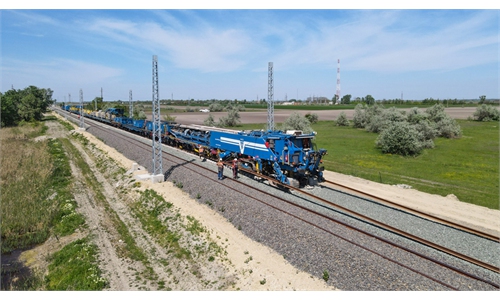Experience of China-Hungary exchanges sets example for others: Global Times editorial

People welcome Chinese President Xi Jinping in Budapest, Hungary, May 8, 2024. Photo: Xinhua
On Thursday, Chinese President Xi Jinping attended a grand welcoming ceremony in Budapest with Hungarian President Tamas Sulyok and Prime Minister Viktor Orban. President Xi then held talks with President Sulyok and Prime Minister Orban. The enthusiastic, friendly and sincere atmosphere in Budapest convinced people that, as good friends and comprehensive strategic partners, China and Hungary are embarking on a "golden voyage" that will only get better as they move forward.
Hungary was one of the first countries to recognize and establish diplomatic relations with China and this year marks the 75th anniversary of diplomatic relations between the two countries. President Xi summarized four-point experience in the smooth development of China-Hungary relations over the past 75 years during his meeting with President Sulyok. These include that both sides should treat each other as equals, uphold mutual trust and mutual assistance, adhere to win-win cooperation, and uphold fairness and justice. This is a summary of the successful experience of China and Hungary, as well as a guide for the future development of bilateral relations. For other EU member states, these valuable four-point experience also has high practical significance.
China and Hungary have different histories, cultures and political systems, yet the two countries have nonetheless become close friends and treated each other with sincerity. The two countries respect each other's unique development paths, and support each other on issues that are of core interest and major concern. This friendship, based on equal treatment, is a treasure for both countries and their peoples. "China-Hungary friendship from generation to generation does not target any third party, nor should it be dictated by any third party." The China-Hungary "golden voyage" is actually the right path for sovereign states to independently and friendly engage with the outside world. This is especially significant for Europe, which is pursuing strategic autonomy.
The cultural exchanges between the two countries serve as a model of mutual learning. Hungary has never obstructed cultural exchanges between the two countries under the pretext of "national security." Hungary leads Europe in Chinese language education. There are five Confucius Institutes in the country, and Chinese language has been incorporated into the national education system and become a subject in the college entrance examination. China and Hungary have also launched scholarship programs to promote students to study abroad in each other's nation. The rich exchanges have not exposed Hungary to national security risks. Instead, it has cultivated a large number of successors who inherit the friendship between the two countries.
Hungary's Prime Minister Orban and Foreign Minister Peter Szijjarto often speak out at international forums against the "decoupling and supply chains disruption" and "small yard and high fence" mentality, and they translate these principles into actions. Openness and cooperation have created win-win results, with lithium batteries being a typical example. Currently, Hungary's share of global lithium-ion battery production capacity ranks second only to the US, placing it among the world's advanced high-tech markets. At the same time, benefiting from Hungary's favorable business environment, more and more Chinese enterprises are investing and setting up factories here, forming a virtuous cycle.
The friendly cooperation between China and Hungary serves as a model for other EU member states, demonstrating a new possibility beyond camp confrontation. The fruitful results achieved through mutual cooperation in various fields between China and Hungary powerfully demonstrate that China represents an opportunity rather than a challenge for Europe, and is a partner rather than a competitor.
In the current international situation, some countries frequently exaggerate ideological conflicts, engaging in the so-called "value-based diplomacy," which fosters division and confrontation in the international community, hampering the process of globalization, and undermining collective efforts to address global challenges. Against this backdrop, the valuable experience gained from the exchanges between China and Hungary becomes even more significant.
As an old Chinese saying goes, "No mountain and ocean can distance people with shared aspirations." Our Hungarian friends often say, "A good friend is more precious than gold." The cognitive horizon of cooperation between China and Hungary transcends mountains and seas, and the cherished friendship between the two countries triumphs over external interference and obstacles. Cooperation between China and Hungary will not settle for merely achieving a perfect score; instead, it aims for higher achievements. Under the strategic guidance of the two countries' leaders, China and Hungary will script a new chapter of cooperation, jointly paving the way for a brighter future.



